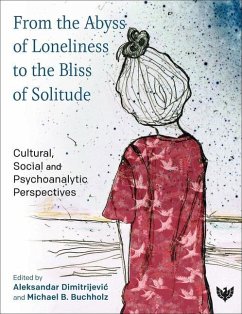
Abyss And Song
Selected Poems
Übersetzer: Louka, Pria
Versandkostenfrei!
Versandfertig in über 4 Wochen
20,99 €
inkl. MwSt.

PAYBACK Punkte
10 °P sammeln!
The first English-language collection of Greek Modernist George Sarantaris, described by Nobel Laureate Odysseus Elytis as "the greatest poet of the Generation of '30," whose laconic lyric poetry oscillates between the philosophical and the erotic. Sarantaris' lucid poems, with their epigrammatic simplicity, recall the ancient Greek poetic tradition while drawing on the French and Italian influences of his time. Louka's translation conveys the freshness of Sarantaris's aphoristic style, metaphorical wit, and philosophical musings. In their condensed precision and attention to landscape, Sarant...
The first English-language collection of Greek Modernist George Sarantaris, described by Nobel Laureate Odysseus Elytis as "the greatest poet of the Generation of '30," whose laconic lyric poetry oscillates between the philosophical and the erotic. Sarantaris' lucid poems, with their epigrammatic simplicity, recall the ancient Greek poetic tradition while drawing on the French and Italian influences of his time. Louka's translation conveys the freshness of Sarantaris's aphoristic style, metaphorical wit, and philosophical musings. In their condensed precision and attention to landscape, Sarantaris's poems may remind English-language readers of his American contemporary Lorine Niedecker and others in the Objectivist circle. "In his brief lifetime, Sarantaris produced poems of exceptional force and beauty. These are verses that ache, that unsettle, that thrum with vitality and precision. Pria Louka, in her graceful, finely-wrought translations, has reproduced the essential purity and interiority of Sarantaris' poems, the same ambiguity and lightness of touch. I will treasure this bilingual volume, and I will urge it upon lovers of poetry everywhere."-- Jhumpa Lahiri "Although the poems in ABYSS AND SONG seem evanescent, almost wispy in their brevity, these fleeting lyrics convey a powerful and universal longing. In this way, Sarantaris's poems function as fragments of a larger, still unfinished poetry project that it is up to each reader to savor and to complete."-- Rachel Hadas "A Sarantaris poem--a product of the subtlest kind of subtraction--is often both epigram and epitaph, aspiring to song while inscribing its own reticence ... Pria Louka's fine translations find ways to convey the oracular qualities of this mysterious poet while retaining the urgency of his acts of abbreviation."-- Christopher Bakken "Through this elegant and comprehensive selection of the poems of George Sarantaris, Pria Louka helps introduce a major twentieth-century Greek poet to readers of English. So poised and exquisite are these translations that they could easily appear on their own, without the Greek original."-- Michael Moore "In the best of these poems, the philosopher and the lyricist work together in a creative symbiosis that produces poetry that concerns itself with the concrete, experiential ramifications of a universal condition. Louka's translations convey both sides of Sarantaris' writing elegantly; her translations read like good poetry in their own right."-- Daniel Barbiero, Arteidolia "The title of this selection, ABYSS AND SONG, taken from the first line of the poem "Anxiety," is a tribute to the dual nature of the philosopher-poet, who oscillated between the "abyss" of contemplation and the "song" of poetry."-- Pria Louka, Caesura "Sarantaris's poems possess an emotional timelessness, a linguistic legacy, and a philosophical sensuality."-- Nicole Yurcaba, Tupelo Quarterly "In the best of these poems, the philosopher and the lyricist work together in a creative symbiosis that produces poetry that concerns itself with the concrete, experiential ramifications of a universal condition."--Daniel Barbiero Poetry. Nature.












